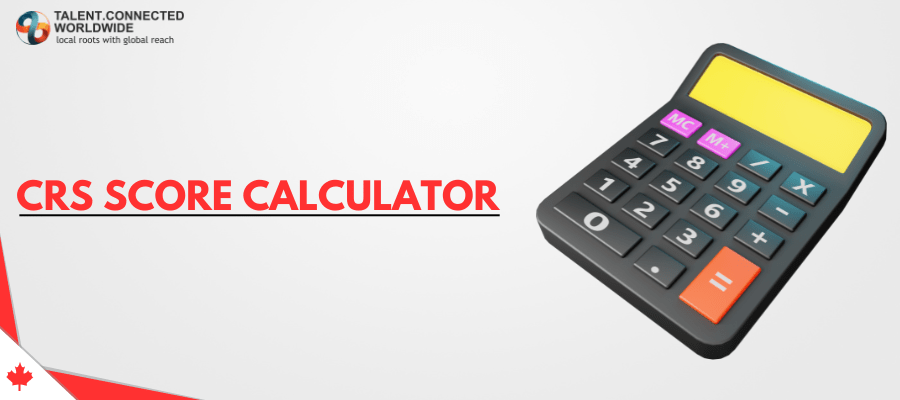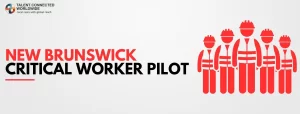
The Comprehensive Ranking System (CRS) is used to rank profiles in the Express Entry pool. A candidate’s profile is scored out of a total of 1,200 points.
The system uses points to assess the scores and the points are given on the basis of one’s age, language proficiency, education, work experience, skills and other factors.
If you want to immigrate to Canada through the Express Entry program, you must create an Express Entry profile. You can do so if you are eligible for any one of the Express Entry programs, which are:
- Canadian Experience Class (CEC)
- Federal Skilled Worker Program (FSWP)
- Federal Skilled Trades Program (FSTP)
Once your Express Entry profile is created, Immigration, Refugees and Citizenship Canada (IRCC) puts it in the pool. The pool is only composed of eligible candidates’ profiles who are awaiting an Express Entry draw. Once a draw is conducted, candidates are invited from the pool to apply for Canada PR. The ITA expires within 60 days and hence, the candidate must submit a completed PR application.
The candidates must have met the CRS cut-off of that round to be invited. Hence, CRS score plays a major role in determining whether or not you qualify to apply for PR.
Download Free Immigration and PR Guide PDF
CRS Score Calculator
The applicant receives more CRS points if:
- their spouse is already a Canadian PR or citizen, or
- their spouse is not coming to Canada with the applicant
CRS points are divided on the following factors:
| Factors | Max Points |
| Core Factors + Spouse or Common-Law Partner Factors | 500 |
| Skill Transferability Factors | 100 |
| Additional Factors | 600 |
| Total | 1,200 |
Let’s break down each factor below:
Core Factors
| Factors | Max. Points (without a spouse/common-law partner) | Max. Points (with a spouse/common-law partner) |
| Work experience gained in Canada | 80 | 70 |
| Age | 110 | 100 |
| Education | 150 | 140 |
| Languages Proficiency | 160 | 150 |
| Total | 500 | 460 |
Canadian Work Experience
Based on the years of work experience you have gained in Canada, and whether or not you would be applying with your spouse or common-law partner, you will gain points.
If you are coming to Canada without a spouse (or if they are already a Canadian citizen or PR), the highest points you can gain based on your Canadian work experience is 80.
| Years of Experience | Points – Without Spouse/Partner (Max. 80) | Points – With Spouse/Partner (Max. 70) |
| 1 | 40 | 35 |
| 2 | 53 | 46 |
| 3 | 64 | 56 |
| 4 | 72 | 63 |
| 5 or more | 80 | 70 |
Age
Though there’s no age limit to obtain a Canada PR, if your age is between 20 to 29 years, you may gain 100 or 110 points, depending on whether your spouse is applying with you.
| Age | Points – Without Spouse/Partner (Max. 110) | Points – With Spouse/Partner (Max. 100) |
| 18 | 99 | 90 |
| 19 | 105 | 95 |
| 20-29 | 110 | 100 |
| 30 | 105 | 95 |
| 31 | 99 | 90 |
| 32 | 94 | 85 |
| 33 | 88 | 80 |
| 34 | 83 | 75 |
| 35 | 77 | 70 |
| 36 | 72 | 65 |
| 37 | 66 | 60 |
| 38 | 61 | 55 |
| 39 | 55 | 50 |
| 40 | 50 | 45 |
| 41 | 39 | 35 |
| 42 | 28 | 25 |
| 43 | 17 | 15 |
| 44 | 6 | 5 |
Education
The highest points you can obtain for your education is 150-140 (whether it was completed in Canada or outside). If your education was completed outside Canada, you must apply for an Educational Credential Assessment (ECA) to showcase that the level of education meets the Canadian standards.
| Education | Points – Without Spouse/Partner (Max. 150) | Points – With Spouse/Partner (Max. 140) |
| Secondary Diploma | 30 | 28 |
| 1-year degree/diploma/certificate (could have gained at a college/university/trade/technical school or other institution) | 90 | 84 |
| 2-year program (could have gained at a college/university/trade/technical school or other institution) | 98 | 91 |
| Bachelor’s degree OR 3-year program (could have gained at a college/university/trade/technical school or other institution) | 120 | 112 |
| 2 or more diplomas/certificates/degrees (one of the programs must have lasted 3 or more years to complete) | 128 | 119 |
| Master’s degree OR Professional degree required to practice a licensed profession | 135 | 126 |
| Ph.D. | 150 | 140 |
Languages Proficiency
You must take a language proficiency test to show that you can converse in English or French when you come to work and live in Canada. Language proficiency allows you to gain the highest points after provincial nomination.
To prove your proficiency, you may take one or more of the following approved language tests:
English language proficiency tests:
French language proficiency tests
| First Language Proficiency | Points per ability- Without Spouse/Partner (Max. 136) | Points per ability- With Spouse/Partner (Max. 128) |
| CLB/NCLC 4 or 5 | 6*4=24 | 6*4=24 |
| CLB/NCLC 6 | 9*4=36 | 8*4=32 |
| CLB/NCLC 7 | 17*4=68 | 16*4=64 |
| CLB/NCLC 8 | 23*4=92 | 22*4=88 |
| CLB/NCLC 9 | 31*4=124 | 29*4=116 |
| CLB/NCLC 10 or more | 34*4=136 | 32*4=128 |
| Second Language Proficiency | Points per ability- Without Spouse/Partner | Points per ability- With Spouse/Partner |
| CLB/NCLC 5 or 6 | 1 | 1 |
| CLB/NCLC 7 or 8 | 3 | 3 |
| CLB/NCLC 9 or more | 6 | 6 |
Spouse or Common-Law Partner Factors
You can also gain points for your spouse’s work experience, education, and language proficiency if they are coming to Canada with you.
| Factors | Points (Max. 40 Points) |
| Work experience gained in Canada | 10 |
| Education | 10 |
| Languages Proficiency | 20 |
Spouse Education Factors
The points are allotted based on how much education they gained over the years.
| Education | Points (Max. 10) |
| Secondary Diploma | 2 |
| 1-year degree/diploma/certificate (could have gained at a college/university/trade/technical school or other institution) | 6 |
| 2-year program (could have gained at a college/university/trade/technical school or other institution) | 7 |
| Bachelor’s degree OR 3-year program (could have gained at a college/university/trade/technical school or other institution) | 8 |
| 2 or more diplomas/certificates/degrees (one of the program must have lasted 3 or more years to complete) | 9 |
| Master’s degree OR Professional degree required to practice a licensed profession | 10 |
| Ph.D. | 10 |
Spouse Language Proficiency Factors
Points are allotted based on their language proficiency.
| Language Proficiency | Points (Max. 20) |
| CLB 5 or 6 | 1 |
| CLB 7 or 8 | 3 |
| CLB 9 or more | 5 |
Spouse Canadian Work Experience Factors
If the spouse or common-law partner has worked in Canada, you can gain a maximum of 10 points for it.
| Canadian work experience (in years) | Points (Max. 10) |
| 1 | 5 |
| 2 | 7 |
| 3 | 8 |
| 4 | 9 |
| 5 or more | 10 |
Skill Transferability Factors
These factors let you earn a maximum of 100 points for your exceptional skills.
| Factors | Points (Max. 100 Points) |
| You have good language skills (CLB level 7) and a postgraduate degree | 50 |
| You have worked in Canada and have a postgraduate degree | 50 |
| You have worked outside Canada and have at least CLB/NCLC level 7 | 50 |
| You have worked in and outside Canada | 50 |
| You have good language skills and a qualification certificate | 50 |
These factors are further broken down below:
1. EDUCATION
| Factor | Points for CLB 7 or more, with one or more under CLB 9 | Points for CLB 9 or more | |
| You have good language skills (CLB level 7) and a postgraduate degree | Post-secondary degree of 1-year or longer | 13 | 25 |
| 2 or more post-secondary degrees and one of them must have been for a program of 3 years or longer | 25 | 50 | |
| Master’s degree or entry-to-practice professional degree that requires to be licensed to practice | 25 | 50 | |
| Ph.D. | 25 | 50 |
| Factor | Points for education + 1 year of work experience | Points for education + 1 year of work experience | Points for education + 2 years of work experience |
| You have worked in Canada and have a postgraduate degree | Post-secondary degree of 1-year or longer | 13 | 25 |
| 2 or more post-secondary degree and one of them must have been for a program of 3 years or longer | 25 | 50 | |
| Master’s degree or entry-to-practice professional degree that requires to be licensed to practice | 25 | 50 | |
| Ph.D. | 25 | 50 |
2. International Work Experience
| Factor | Years of Experience | Points for work experience + CLB 7 or more, one or more under 9 | Points for work experience + CLB 9 or more |
| You have worked outside Canada and have at least CLB/NCLC level 7 | 1 or 2 | 13 | 25 |
| 3 | 25 | 50 |
| Factor | Points for certificate of qualification + CLB 5 or more, one or more under 7 | Points for certificate of qualification + CLB 7 or more |
| You have good language skills and a qualification certificate | 25 | 50 |
Additional Factors
These factors let you gain additional points. The maximum you can gain here is 600 points.
| Factors | Points (Max. 600 Points) |
| Your sibling is a Canadian citizen or permanent resident | 15 |
| You completed post-secondary education in Canada (1 or 2 years) | 15 |
| You scored NCLC level 7 or higher French language test, and CLB 5 or higher on English test | 25 |
| You completed post-secondary education in Canada (3 or more years) | 30 |
| You scored NCLC level 7 or higher French language test, and CLB 5 or higher in English test | 50 |
| Job Offer in NOC TEER 1, 2 or 3, or any TEER 0 (except for Major group 00) | 50 |
| Job Offer in TEER 0 Major group 00 | 200 |
| You have a provincial nomination | 600 |
Tips to Increase CRS Score
Follow the tips provided to improve your CRS score and increase your chances of obtaining Canada PR.
- The best way that almost ensure you an ITA is obtaining a provincial nomination. A provincial nomination certificate provides you an additional 600 CRS points. This means, even if you gained 200 points on the CRS score calculator and you get an extra 600 points, you now have 800 points. This practically ensures you an invitation in the next draw.
- Score higher on language proficiency tests. If you have only taken a single language test, try taking another one. As you can see in the language proficiency category above, you can receive additional points if you know both the official languages of Canada (English and French).
- You can gain higher points if you improve your level of education, and gain more work experience.
On average, a person may gain about 400 – 480 CRS points. However, this is not the usual CRS cut-off of general Express Entry draws conducted by IRCC nowadays. Most of the general draws’ CRS requirement has been above 500 points. Take a look at the general draws conducted in 2024 so far.
| Date | Round type | ITAs issued | CRS cut-off |
| 23-Apr-2024 | General | 2,095 | 529 |
| 10-Apr-2024 | General | 1,280 | 549 |
| 25-Mar-2024 | General | 1,980 | 524 |
| 12-Mar-2024 | General | 2,850 | 525 |
| 28-Feb-2024 | General | 1,470 | 534 |
| 13-Feb-2024 | General | 1,490 | 535 |
| 31-Jan-2024 | General | 730 | 541 |
| 23-Jan-2024 | General | 1,040 | 543 |
Since the draws have been getting quite competitive, it is necessary that you score a higher CRS score. Hence, use the above tips to increase your chances of receiving an ITA in a draw, or contact us at +91 844-838-6496 today and learn all the possible ways to obtain permanent residency in Canada.
Remember to fill out the form below for some insights and advice from our experts!





